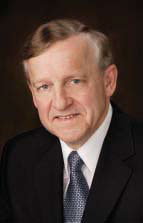AVMA Answers: First step in the one-health initiative
The Executive Board in April approved the establishment of a One Health Initiative Task Force, as recommended by AVMA President Roger K. Mahr (see JAVMA, May 15, page 1434). This task force will articulate a vision of one health that will enhance the integration of animal, human, and environmental health for the mutual benefit of all.
Later that month, after a speaking engagement at a public health symposium sponsored jointly by the Association of American Veterinary Medical Colleges and the Association of Schools of Public Health in Atlanta and before leaving for the International Veterinary Officers Council meeting in New Zealand, Dr. Mahr brought JAVMA up to date on the one-health initiative.
Are you encouraged by the Executive Board's approval of your recommendation to establish a One Health Initiative Task Force?
 Dr. Roger K. Mahr, AVMA President, responds:
Dr. Roger K. Mahr, AVMA President, responds:
I am pleased that the AVMA on behalf of the veterinary profession has committed to assume a major leadership role to establish a coordinated mechanism to facilitate collaboration and cooperation among the various health science associations, colleges, government agencies, and industries with a focus on one world, one health, one medicine. By working together with our colleagues in human medicine, public health and environmental science, we can accomplish more to improve health worldwide than we can alone.
I consider the task force as the first step, and most critically important, of the one-health initiative. I envision that the success of the task force will lead to an integrated national strategy for one health, one medicine.
What progress has been made since the board meeting?
Many outstanding visionary individuals with an appreciation for the one-health concept have indicated their desired commitment to serve on the task force. Executive Board chair Dr. Jim Cook will appoint 12 of these individuals, with one designated as task force chair, from the various health science professions, academia (including two students), government, and industry. The composition of the task force will be announced during the AVMA Annual Convention. The first meeting of the task force will be scheduled in a timely manner following the convention.
Over the past year, you have often articulated the concept of one world, one health, one medicine. Can you tell us about a few people who already exemplify the concept?
Certainly the one-health concept is not new. There are so many excellent examples of veterinarians and their counterparts in human medicine, public health, and environmental science who are making valuable contributions toward improving global health.
One such colleague is Ronald M. Davis, MD, who in June will become the first public health physician to serve as president of the American Medical Association. A preventive medicine specialist, Dr. Davis has been a prominent voice on public health issues, including tobacco use, obesity, and vaccinations. Interestingly, he is currently primary investigator on a project involving the effect of secondhand smoke on household pets.
Julie L. Gerberding, MD, director of the Centers for Disease Control and Prevention, is another example of a physician involved in public health and zoonotic disease work. Dr. Gerberding, who has a master's in public health, was involved in the CDC's response to anthrax bioterrorism and has developed programs to prevent infections and antimicrobial resistance. We are fortunate to have Dr. Gerberding speaking at the AVMA Annual Convention next month, as well as Anthony S. Fauci, MD.
Dr. Fauci, the renowned researcher on AIDS and HIV, is director of the National Institute of Allergy and Infectious Diseases. He has made many contributions to basic and clinical research on the pathogenesis and treatment of immune-mediated diseases. Dr. Fauci will speak at our convention on avian influenza and the challenge of emerging and reemerging infectious diseases.
One of the veterinarians who are making important contributions at the CDC is Dr. Lonnie J. King, director of the new National Center for Zoonotic, Vector-Borne, and Enteric Diseases within the CDC's Coordinating Center for Infectious Diseases (see article). Dr. King, who holds a master's degree in epidemiology and public administration, is the first veterinarian to be director of a center at the CDC. He is an expert on zoonotic diseases, food safety, and veterinary preventive medicine.
What is it that you would most like AVMA members to do or to begin thinking about, so that they can become engaged in this collaborative one-health initiative?
One of the things veterinarians can do is come to Dr. Gerberding's keynote address at the opening session of the AVMA Annual Convention, July 14 in our nation's capital. Dr. Gerberding will address why veterinarians are key to achieving optimal public health, and how they fit into one of the CDC's top priorities—zoonotic diseases. She will talk about how veterinarians can start the all-important dialogue with physicians, and how all veterinarians can make a difference.
While the one-health initiative may outwardly seem solely focused on the veterinary profession's relationship with the other health professions, it is also a focus of the integrated nature of the various segments of our own profession. Our societal responsibilities encompass diligent defense of our food supply, protection of animals and human beings from zoonotic disease, and fostering of the human animal bond through the care of pets.
Healthy animals mean healthy people.